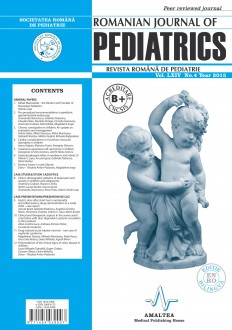SELECT ISSUE

Indexed

| |

|
|
|
| |
|
|
|

|
|
|
|
|
|
|
HIGHLIGHTS
National Awards “Science and Research”
NEW! RJP has announced the annually National Award for "Science and Research" for the best scientific articles published throughout the year in the official journal.
Read the Recommendations for the Conduct, Reporting, Editing, and Publication of Scholarly work in Medical Journals.
The published medical research literature is a global public good. Medical journal editors have a social responsibility to promote global health by publishing, whenever possible, research that furthers health worldwide.
COMPARISON OF THE EFFICIENCY OF CAFFEINE VERSUS AMINOPHYLLINE FOR THE TREATMENT OF APNOEA OF PREMATURITY
Gabriela Ildiko Zonda, Andreea Avasiloaiei, Mihaela Moscalu and Maria Stamatin
ABSTRACT
Purpose. Comparison of the efficiency of caffeine and aminophylline for the treatment of apnoea in premature neonates.
Material and method. We conducted a retrospective study on two lots of premature infants admitted in the Regional Centre of Neonatal Intensive Care Unit of the “Cuza-Vodă” Clinical Hospital of Obstetrics and Gynaecology of Iasi during June 2012 – June 2015.
Results. Neonates treated with caffeine had significantly less apnoea on day 3 and 14 of treatment comparing with those who received aminophylline. Caffeine treatment was associated with less need for CPAP and mechanical ventilation comparing with aminophylline, but there was no statistical significance. Anemia, intraventricular hemorrhage, persistent ductus arteriosus and chronic lung disease were correlated with an increased duration of the treatment for apnoea of prematurity. Neonates from the caffeine group had more episodes of agitation, tachycardia and digestive intolerance, but at the same time a reduced incidence of necrotizing enterocolitis, weight loss and hypertension, compared to those from the aminophylline group. The hospital stay duration was reduced in the infants that received caffeine treatment compared to those that received aminophylline.
Conclusion. The therapeutic advantages of caffeine are remarkable due to low incidence of significant adverse effects and its long-term cost/efficiency ratio, which recommend it as the best treatment for apnoea of prematurity. These facts justify the initiation of a multicentre national study including a higher number of premature neonates for the evaluation of the efficiency of caffeine therapy in all gestational age groups.
Keywords: apnoea, prematurity, methylxanthines, caffeine
